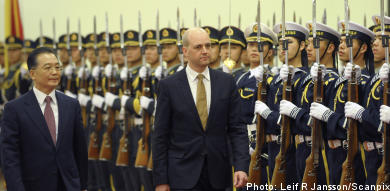In the fall of 2006, I stood and waited patiently to hear Bill Clinton speak at a campaign event for Jim Webb, who ended up winning a seat in the US Senate that year.
Every Democratic politician in the entire state of Virginia, the state Webb now represents, had a chance to speak before Clinton came to the podium with the last word.
“Everything has been said, but not everyone said everything,” said the battle tested Clinton.
The situation is similar to the current debate about the Olympics, China, and Prime Minister Fredrik Reinfeldt’s trip. Much has been said, but there are a few things worth repeating.
To start with, China has, unfortunately, been awarded the Games, which can’t simply be boycotted completely. But the Olympics are political and a continued discussion about the Opening Ceremonies, democracy, and human rights, is therefore needed.
Columnist Jesper Bengtsson from the Aftonbladet newspaper pointed out that swimmer Stefan Nystrand has said that China should never have gotten the Games. Nystrand isn’t planning on an individual boycott, but he is considering a show of solidarity for Burma if he makes it to the medal stand. Imagine Nystrand winning a medal and then wearing a t-shirt featuring a picture of Aung San Suu Kyi!
Hanna Finmo, editor of Morgonbris, the newspaper of the Social Democratic women’s organization, has pointed out that athletes aren’t the only ones who should seek to do what’s right. Companies, and even we consumers, also have share a large part of the responsibility.
Author and columnist Olle Svenning believes the media ought to be able to do two things at once: “show an interest in the drama surrounding the discus competition and for the dictatorship’s political prisoners.” An important request, indeed.
Mats Engström, an advisor to former foreign minister Anna Lindh and now at Aftonbladet, picked apart Reinfeldt’s idea that China, the climate, and democracy aren’t connected. History shows that a strong environmental movement demands real change. One of the cases which Mona Sahlin demands Reinfeldt address is Hu Jia, who was one of the founding members of China’s environmental movement.
At the time of this writing it is still unclear how Reinfeldt’s visit to China will develop. Veteran political journalist Björn Elmbrant earlier warned of the “Reinfeldt doctrine”: a wandering glance, indecision, and a wet finger to the wind.
During visits with President Bush and California Governor Arnold Schwarzenegger, Reinfeldt shied away from tough issues. Let’s hope that he’s less conflict-averse this time around.
Before his trip, Reinfeldt underlined his lack of strategy when he declared that Sweden wouldn’t boycott the Olympic ceremonies.
A shrewd politician wouldn’t play such an important card right away, something Mona Sahlin has wisely pointed out.
The relationship between China and Sweden’s social democracy is an interesting one. It’s widely known that less frozen (read: more realistic) elements of China’s communist party are interested in the Swedish model and the Social Democratic Party. An interest which may increase when China’s mix of capitalism and dictatorship ends and must be replaced by something else.
In this situation, Swedish social democrats must keep their wits about them and bear in mind the interests of their undemocratic admirer.
It’s easy to be defended by China, something that, unfortunately, socialists in France and Belgium allow to happen all too often.
A dialogue in which one is continuously demanding change and respect for human rights is acceptable, but bilateral cooperation with a one-party state is unthinkable, and ought to remain so for all social democratic parties.
The question is what Reinfeldt is saying while in China. He won’t say everything, but hopefully he’ll at least say something. And if he says what he must and should say, it’s a positive surprise based on very low expectations.
Eric Sundström is Editor-in-Chief of Aktuellt i Politiken, a weekly publication distributed nationally in Sweden which examines political and societal issues from a social democratic perspective. It is produced by AiP Media Produktion, a subsidiary of the Social Democratic Party.



 Please whitelist us to continue reading.
Please whitelist us to continue reading.